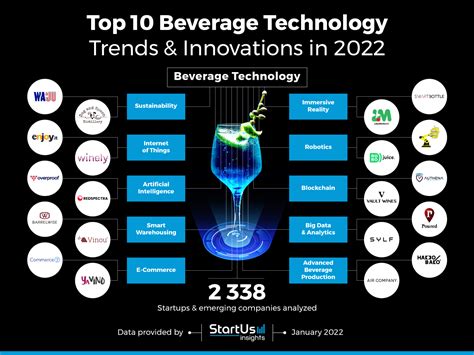The beverage industry is constantly evolving, with new trends and technologies emerging every year. From sustainable packaging to innovative flavor profiles, the industry is driven by consumer demand for healthier, more sustainable, and unique products. In this article, we will explore the top beverage technology trends to watch, from manufacturing and packaging to marketing and sales.
The Rise of Sustainable Packaging

Companies like Coca-Cola and PepsiCo are already making significant investments in sustainable packaging. For example, Coca-Cola has set a goal to collect and recycle the equivalent of every can or bottle it sells globally by 2030. Similarly, PepsiCo has committed to making 100% of its packaging recyclable, reusable, or biodegradable by 2025.
Benefits of Sustainable Packaging
- Reduced waste and pollution
- Lower carbon footprint
- Increased consumer trust and loyalty
- Cost savings through reduced packaging material usage
Artificial Intelligence and Machine Learning

AI-powered sensors can monitor production lines, detect anomalies, and predict maintenance needs, reducing downtime and increasing productivity. ML algorithms can analyze consumer data, preferences, and behavior to create personalized marketing campaigns and product recommendations.
Companies like Anheuser-Busch and Diageo are already leveraging AI and ML to optimize their operations and marketing strategies. For example, Anheuser-Busch uses AI-powered sensors to monitor its brewing process, ensuring consistent quality and reducing waste.
Benefits of AI and ML
- Improved efficiency and productivity
- Enhanced customer experiences and personalization
- Increased predictive maintenance and reduced downtime
- Better decision-making through data-driven insights
Innovative Flavor Profiles and Ingredients

From plant-based milks to CBD-infused drinks, companies are experimenting with new ingredients and flavor combinations. For example, Coca-Cola launched a line of sparkling water infused with CBD, while PepsiCo introduced a plant-based milk alternative.
Benefits of Innovative Flavor Profiles and Ingredients
- Increased consumer interest and engagement
- Differentiation and competitive advantage
- Opportunities for premium pricing and revenue growth
- Improved brand reputation and loyalty
Digital Marketing and E-commerce

E-commerce platforms like Amazon and Drizly are making it easier for consumers to purchase beverages online, while social media platforms like Instagram and Facebook are providing companies with new ways to connect with customers and showcase their products.
Benefits of Digital Marketing and E-commerce
- Increased brand awareness and reach
- Improved customer engagement and loyalty
- Opportunities for data-driven marketing and personalization
- Increased sales and revenue growth through e-commerce channels
Craft and Specialty Beverages

Craft breweries like Lagunitas and Stone Brewing are already leveraging this trend, while companies like Starbucks and Peet's Coffee are introducing new specialty coffee products.
Benefits of Craft and Specialty Beverages
- Increased consumer interest and engagement
- Differentiation and competitive advantage
- Opportunities for premium pricing and revenue growth
- Improved brand reputation and loyalty
Smart Packaging and IoT

Smart packaging technologies like QR codes and RFID tags can provide consumers with information about the product, while IoT sensors can monitor production lines and predict maintenance needs.
Benefits of Smart Packaging and IoT
- Improved consumer engagement and interaction
- Increased supply chain efficiency and productivity
- Opportunities for predictive maintenance and reduced downtime
- Improved product safety and quality control
Low- and No-Calorie Beverages

Companies like Coca-Cola and PepsiCo are already introducing low-calorie products, while companies like Zevia and LaCroix are offering sugar-free and low-calorie alternatives.
Benefits of Low- and No-Calorie Beverages
- Increased consumer interest and engagement
- Differentiation and competitive advantage
- Opportunities for premium pricing and revenue growth
- Improved brand reputation and loyalty
Plant-Based and Vegan Beverages

Companies like Silk and So Delicious are already offering plant-based milk alternatives, while companies like Frey and Seghesio are introducing vegan wine options.
Benefits of Plant-Based and Vegan Beverages
- Increased consumer interest and engagement
- Differentiation and competitive advantage
- Opportunities for premium pricing and revenue growth
- Improved brand reputation and loyalty






Gallery of Beverage Trends
Stay ahead of the curve and keep up-to-date with the latest beverage trends. From sustainable packaging to innovative flavor profiles, these trends are shaping the industry and driving consumer demand.
Conclusion
The beverage industry is constantly evolving, with new trends and technologies emerging every year. From sustainable packaging to innovative flavor profiles, companies are responding to consumer demand for healthier, more sustainable, and unique products. By staying ahead of the curve and leveraging these trends, companies can drive growth, improve brand reputation, and increase consumer engagement.
What are the top beverage trends to watch?
+The top beverage trends to watch include sustainable packaging, artificial intelligence and machine learning, innovative flavor profiles and ingredients, digital marketing and e-commerce, craft and specialty beverages, smart packaging and IoT, low- and no-calorie beverages, and plant-based and vegan beverages.
How can companies benefit from these trends?
+Companies can benefit from these trends by driving growth, improving brand reputation, and increasing consumer engagement. By leveraging sustainable packaging, innovative flavor profiles, and digital marketing, companies can differentiate themselves from competitors and attract new customers.
What role does technology play in the beverage industry?
+Technology plays a significant role in the beverage industry, from manufacturing and packaging to marketing and sales. Artificial intelligence, machine learning, and IoT are transforming the industry, providing companies with new ways to interact with consumers, improve supply chain efficiency, and drive growth.
